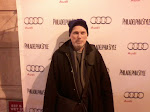Johnny Depp and George Bush
Was Milton’s Paradise Lost a farewell to Cromwell and the Congregationalist Commonwealth? Sometimes I think I’m living in 17th century Britain. I had grown hot for Rochester’s poetry just before Johnny Depp made The Libertine. Oft do I ogle Dyke’s Sucking at the Musee Prick; translation: I love van Dyke’s portrait of Sir John Suckling, the Cavalier poet, here in New York at the Frick Museum. Michael Leapman’s book on Inigo Jones and Ben Jonson filled in some blanks on the arts and the court. I have just finished The Cradle King, a biography of James I by Alan Stewart of Columbia U. In the 17th century, England evolved from a monarchy into a democracy. But the people at the time didn’t realize what was happening. Cromwell, for instance, thought the English Civil War was all about religion. And thus it seems even stranger that Bush and Blair could march into Iraq and “impose” democracy. Bush is a blind actor on history’s stage, but I myself am conscious mostly of the fog.


6 Comments:
I didn't know the Suckling painting was at the Frick!
Exciting!
Have you ever read Suckling's treatise on Socinianism? Socinius was a forerunner of the Unitarian belief that reason would be enough for humanity.
Suckling backed him, but according to John Aubrey, in Brief Lives, there was a marvelous setting for Suckling's essay. He went with Tom Carey and some other poets to a country inn where Carey made an assignation with a maid at midnight. Suckling overheard it and informed the butler that if Carey were to venture out of his rooms at midnight the butler was to restrain him with all due force because Carey suffered from sleepwalking and would often injure himself if allowed to wander the grounds.
So Carey went out just before midnight and the butler restrained him with force, and Suckling giggled over the sounds of the contest while he squibbed his essay on Socinianism by candlelight.
The Van Dykes at the Frick bring the 17th century English royalists to life. The Cavalier poets knew how to gather rosebuds. Suckling reminds me of Machiavelli's remark in The Prince, that Fortune is a woman and thus prefers the violent ministrations of the young to the polite lassitude of the old.
Why so dull and mute, young sinner?
Prithee, why so mute?
Will, when speaking well can't win her,
Saying nothing do it?
Prithee, why so mute?
(--Sir John Suckling, 1638)
Suckling is marvelous. I've even read his plays. One of them was originally a tragedy but a beautiful young woman complained she'd have liked it better if it had had a comic ending so he changed it for her.
Have you read Aubrey's Brief Lives?
I'd like the prose model in that to be the model for the book of Corso brief snapshots that I'm assembling.
Incredibly inventive sentences.
I think that Suckling was the model for Milton's Lucifer. It would take me ten years to prove that in book form, so it's not worth it, but it's my hunch.
I bought a used Folio Society edition of Aubrey's Brief Lives after reading An Instance of the Fingerpost, a mystery set among the learned of late 17th century England. Aubrey is exceedingly curious. My friend Katinka Matson also wrote a book called Brief Lives; but it was about self-destructive poets and artists of the 20th century. She gave the title a twist.
What is the secret of Aubrey's prose?
It's that which I wish to bottle in the Corso book.
Aubrey's Brief Lives consists of open, random notes. You never know what you'll find. It's always a surprise.
Post a Comment
Subscribe to Post Comments [Atom]
<< Home